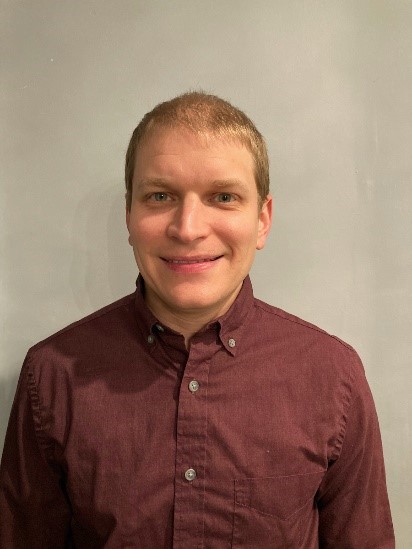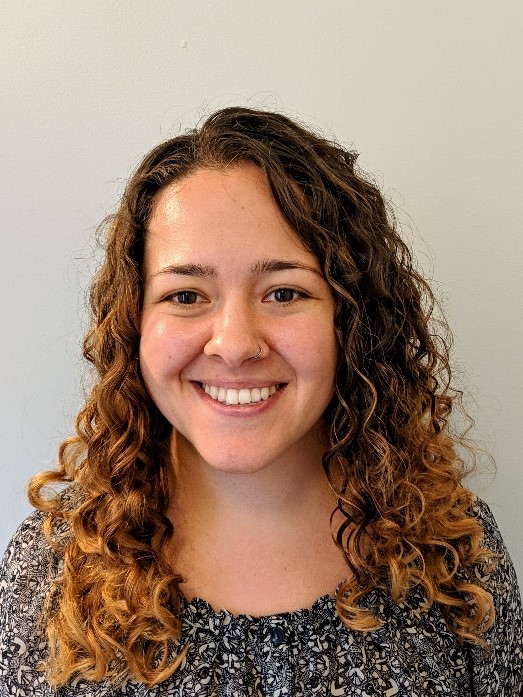2020-2021 IS Fellowship Cohort
In 2020, the JHU CFAR received funding to renew their inter-CFAR Implementation Science Fellowship for early stage investigators in HIV-related research. This cohort included 24 trainees from 13 institutions across the U.S.
Meet Our inter-CFAR 2019-2020 Implementation Science Fellows

Dr. Justin Knox is an epidemiologist whose research has focused on HIV, substance use, social networks, and racial and sexual minorities. Dr. Knox earned his PhD in Epidemiology from Columbia University where his dissertation focused on substance use and HIV risk among social networks of Black South African men who have sex with men, work funded by a Ruth L. Kirschstein National Research Service Award from the National Institute on Drug Abuse and the U.S. Fulbright Student Program. Dr. Knox has a Master’s of Public Health from Columbia University, a Master’s of Science in Medical Anthropology from University College London, and a Bachelor’s of Arts from Middlebury College. He also served as a Peace Corps volunteer in Swaziland.

Dr. Arjee Restar, PhD, MPH’s research engagements in public health concentrate on promoting structural and behavior-based interventions to improve the health of communities affected by a multitude of adverse sexual and mental health outcomes, such as HIV/AIDS and other sexually transmitted infections, sexual violence, and suicidality, particularly as experienced by transgender and gender-nonconforming communities of color. This work includes advocating for institutional policies and practices that dismantle systems of oppression, inequality, and inequity.

Dr. Brian Zanoni completed a combined Internal Medicine and Pediatrics residency at Baylor College of Medicine. He then worked in Botswana and South Africa from 2006 to 2012 treating both adults and children living with HIV and tuberculosis, conducting pediatric HIV-outcomes research, and training local staff in HIV management. While living in South Africa, he founded the Teen Clinic at Don McKenzie Hospital and the non-profit organization, Umndeni Care Program which focuses on in-home HIV and TB testing and linkage to care in rural KwaZulu-Natal. He completed Infectious Disease and HIV fellowships at Massachusetts General Hospital and Brigham and Woman’s Hospital and earned an MPH from Harvard T.H. Chan School of Public Health. His research focuses on transition care for adolescents living with HIV in South Africa. He recently joined the faculty of Emory University as an Assistant Professor in Medicine and Pediatric Infectious Diseases.

L. Lauren Brown, PhD, LCSW, is an Assistant Professor of Psychiatry and Behavioral Sciences in the Department of Medicine at Meharry Medical College, where she devotes her time to conducting research for the Center for the Study of the Social Determinants of Health. She also is an Adjunct Assistant Professor of Medicine at Vanderbilt University Medical Center and serves on the Executive Committee for the TN Center for AIDS Research where she co-directs the Disparities of Health Scientific Working Group. Prior to joining Meharry faculty, Dr. Brown was the Director of Behavioral Health and Research at Nashville CARES and spent years providing direct care for survivors of psychological trauma. Her research predominately focuses on the Southern United States and South Africa and concentrates on trauma-informed HIV care and the mitigation of intimate partner violence among women living with HIV.

Brandon Knettel, Ph.D. is a licensed psychologist and assistant research professor in the Duke University School of Nursing with a secondary appointment in the Duke Global Health Institute. His areas of specialization are global mental health and health behavior, with a focus on care engagement, stigma reduction, and mental health support for people living with HIV. Dr. Knettel’s international projects are primarily located in Moshi, Tanzania, where he recently completed a one-year VECD Fogarty Global Health Fellowship to evaluate a community health worker program for HIV care engagement. Dr. Knettel has been a member of the Duke CFAR since 2016 and previously served as Coordinator of the CFAR’s Social and Behavioral Sciences Core.

Dr. Sean Arayasirikul, PhD (they/them, he/him) is a medical sociologist, Senior Research Scientist at the San Francisco Department of Public Health, and Assistant Professor at UCSF. They are part of the leadership of the Trans Research Unit for Equity (TRUE) where they are engaged in research on the implementation science of mHealth HIV prevention and care interventions and investigating the root causes of systemic oppression, social structure and stratification, and their impact on sexual and gender minority health. They are a scholar-activist committed to emancipatory health equity research and a national leader in the house and ballroom community.

Dr. Latesha Elopre is an Assistant Professor of Infectious Diseases at the University of Alabama at Birmingham. She completed her medical degree at University of Florida’s College of Medicine. She then underwent Internal Medicine Residency and Infectious Diseases’ Fellowship training at University of Alabama at Birmingham, during which she also received her MSPH in Applied Epidemiology. Her research has focused on understanding how to increase uptake of biomedical HIV prevention tools, like PrEP, among vulnerable populations including Young, Black gay and bisexual men as well as rural Black women.

Steven A. John, PhD, MPH, (he/him) is an Assistant Professor at the Medical College of Wisconsin within the Center for AIDS Intervention Research. He received his MPH and PhD in Public Health from the University of Wisconsin-Milwaukee and completed a Postdoctoral Fellowship in Biostatistics and Behavioral Science at the Center for HIV/AIDS Educational Studies and Training at Hunter College, CUNY. Dr. John’s research focuses on prevention across the HIV prevention continuum using behavioral, biomedical, and technology-based platforms to reduce HIV/STI disparities. He is currently supported by a NIMH Research Scientist Development Award (K01-MH118939) and serves on the Editorial Boards of AIDS and Behavior, Archives of Sexual Behavior, and Sexuality Research and Social Policy.

Dr. Karen Johnson is an Assistant Professor at the University of Alabama (UA), School of Social Work. She received her Ph.D. from Columbia University (CU) School of Social Work and completed post-doctoral training in Global Mental Health and Implementation Science (IS) from CU / New York State (NYS) Psychiatric Institute. Dr. Johnson is an affiliate with the University of Alabama at Birmingham (UAB) Center for AIDS Research and a UAB National Institutes of Health (NIH) funded Minority Health and Health Disparities research fellow. Dr. Johnson’s research explores historical, cultural, and contextual factors (e.g. trauma, oppression, religiosity, stigma, place) that drives sexual risk behaviors in Black women in the criminal justice system in the Northeast and the deep South. Her work specifically focuses on 1) decreasing HIV/sexual risk behaviors and co-occurring risks among justice-involved, drug-using women across the life course; 2) evidence-based intervention adaptation, acculturation, and implementation; and 3) peer-led interventions. Dr. Johnson has served as a co-investigator and led NIH and Substance Abuse and Mental Health Services Administration funded intervention adaptation and implementation studies. She is a NYS Office of Mental Health Policy Scholar, a UA Center on Community-Based Partnerships fellowship awardee, and has designed/implemented four IS-focused pilot studies.

Jonathan Ross, M,D MS is an internal medicine and HIV primary care physician and Assistant Professor in the Division of General Internal Medicine at Albert Einstein College of Medicine and Montefiore Health System. His research focuses on evaluating HIV health services in Rwanda and understanding and reducing barriers to HIV care among immigrants in the U.S. Prior to joining the faculty at Einstein/Montefiore, Dr. Ross received a medical degree from Weill Cornell Medical College, completed residency training at Montefiore in the Primary Care/Social Internal Medicine program and received a Master’s in Clinical Research Methods through Albert Einstein College of Medicine.

Whitney Sewell, PhD, MSW is a postdoctoral fellow and emerging scholar working with Drs. Julia Marcus and Doug Krakower in the Department of Population Medicine at Harvard Medical School and Harvard Pilgrim Health Care Institute. Her primary research focuses on preexposure prophylaxis (PrEP) access and implementation, particularly for Black Women in the United States. Dr. Sewell will apply implementation science frameworks and approaches to improve PrEP scale-up for Black women in safety-net settings. Dr. Sewell received her doctoral degree in social work from the Brown School of Social Work at Washington University in St. Louis, and completed a master’s degree in social work at the University of North Carolina at Chapel Hill.

Jeb Jones, PhD, MPH, MS is an assistant professor in the Department of Epidemiology at Emory University. His research focuses on behavioral aspects of HIV risk, risk assessment methods, mobile-based HIV prevention interventions, and mathematical modeling approaches to understanding the HIV epidemic among sexual and gender minorities.

Margaret (Waru) Gichane, PhD, MSPH, is an Investigator in the Substance Use Gender and Applied Research Program at RTI International. Her research focuses on examining and addressing social and structural factors that produce disparities in sexual and reproductive health outcomes among key populations. Dr. Gichane utilizes mixed, participatory, and applied qualitative methods to evaluate interventions. Her current research is focused on understanding pre-exposure prophylaxis use among pregnant young women in South Africa. Dr. Gichane received her PhD and MSPH in Health Behavior from the Gillings School of Public Health at the University of North Carolina at Chapel Hill.

Gus Klein, PhD, MSW is a postdoctoral fellow and senior research associate at the Hunter Alliance for Research and Translation (HART) at Hunter College at the City University of New York (CUNY). Gus’ research is informed by over 20 years of professional experience as a social worker and utilizes a community-engaged practice-driven implementation science framework to identify mechanisms and processes at the structural, interpersonal, and individual levels to promote health equity among LGBTQ individuals, with specific focus on transgender, non-binary, and gender diverse individuals. His research situates negative health outcomes as a complex social and psychological process driven by social oppression, rather than solely individual behavior. Gus lives in Brooklyn, NY with his spouse and 16-year-old dog and enjoys riding his bike, cooking and listening to podcasts.

Sarah E. Rutstein, MD, PhD, is a health services clinician researcher with a background in health policy, decision sciences, and infectious diseases. Her work is focused on developing, implementing, and evaluating HIV prevention, testing, and treatment programs in resource-limited settings. Past work in Malawi emphasizes early identification and intervention for persons at greatest risk of onward transmission including rapid-start antiretroviral therapy for persons with acute HIV infection, cost-effectiveness analyses of assisted partner notification strategies, and differentiated care pathways for persons failing first-line antiretroviral therapy. Dr. Rutstein’s overarching career goal is to support the efficient and sustainable scale-up of evidence-based interventions in low-resource settings.

Dr. Matt Hickey is a physician and HIV fellow at UCSF in the Division of HIV, Infectious Disease, & Global Medicine at San Francisco General Hospital. His research interests include evaluation of implementation strategies to improve integrated service delivery for people living with HIV. His primary research program focuses on patient-centered integration of HIV and noncommunicable disease treatment in Kenya and Uganda. Additionally, he is interested in implementation and evaluation of low-barrier, incentivized HIV primary care for people experiencing homelessness in San Francisco.

Kate Shearer, PhD, MPH is a Research Associate at the Johns Hopkins University School of Medicine. She completed her PhD in the Department of Epidemiology at the Johns Hopkins Bloomberg School of Public Health and is currently based in Johannesburg, South Africa where she supports implementation science research projects focused on TB preventive therapy delivery in several countries in Southern Africa. Her other research interests include new diagnostics for tuberculosis and treatment outcomes for people living with HIV.

Dr. Jun Tao is an assistant professor at Brown University and an infectious diseases epidemiologist at the Miriam Hospital. Her main research interests are HIV/AIDS prevention and intervention, using a big-data approach to capture health-related outcomes, and PrEP promotion among racial/ethnic minorities. She currently has a K01 award promoting PrEP uptake among Black/African American and Hispanic/Latino MSM.

Bryan Kutner, PhD, MPH is a health behavior psychologist with training in clinical psychologist and epidemiology. At the HIV Center for Clinical and Behavioral Studies at the New York Psychiatric Institute and Columbia University, he studies the sources and sequelae of HIV-related stigma and the development of workforce development strategies to mitigate stigma in healthcare settings. His primary interest is identifying stigma reduction techniques and mechanisms of action to improve engagement across the HIV care continuum. He has worked for over 20 years on educational programs to promote evidence-based practices and cultural competence among frontline HIV and harm reduction workers, including in the United States, China, the Caribbean, and sub-Saharan Africa.

Dr. Schenita Randolph is an Assistant Professor in the Duke School of Nursing and Co-Director of the Community Engagement Core of the Duke Center for REsearch to AdvanCe Healthcare Equity (REACH Equity). Her overarching goal as a nurse scholar is to address the root causes of health disparities and promote sexual health equity for racial/ethnic minority populations, more specifically, Black adolescents and their families and communities. Dr. Randolph and her team are developing and testing a multifaceted implementation strategy to improve awareness and uptake of PrEP among Black women in the US south through the engagement of beauty salons, stylists training, modules and videos and PrEP Navigators; this work has been funded by Center for AIDS Research, NINR and Gilead Sciences.

Laura Beres, PhD, MPH is an Assistant Scientist in the Department of International Health at the Johns Hopkins Bloomberg School of Public Health. Dr. Beres' mixed-methods implementation research focuses on the development and evaluation of interventions to effectively prevent and treat HIV in low resource settings, particularly sub-Saharan Africa, with the goal of identifying and applying optimized practices in real-world settings. She is leading innovative human-centered design and other formative and participatory approaches to appropriately tailor implementation strategies and outcomes measurement, and to promote the translation of evidence to action. Her work seeks to understand behavior change processes across a social ecological framework, attentive to influences including violence, particularly among women living with HIV.

Amy K Johnson, PhD MSW, is a Research Assistant Professor in the Division of Adolescent Medicine at Ann & Robert H. Lurie Children’s Hospital and the Departments of Pediatrics and Preventive Medicine at Northwestern University in Chicago, IL. Her current research program has three primary foci, including HIV/AIDS service evaluation and capacity development, basic HIV prevention research among adolescents, epidemiology of STDs, and most recently, HIV prevention and treatment among cisgender women. Amy received her PhD in Public Health and her Masters Degree in Social Work from the University of Illinois at Chicago. She has published manuscripts on a wide variety of applied public health topics including intervention development and testing, program evaluation, qualitative methods, and surveillance of STDs.

Kaylee Crockett, PhD is a clinical health psychologist and Assistant Professor of Family and Community Medicine at the University of Alabama at Birmingham. Her research focuses on social and behavioral factors that contribute to multi-morbidity in people with HIV. She is developing a project to address cardiovascular disease risk in women affected by HIV in the southeastern US.

Dr. Melissa Stockton is a Global Mental Health and Implementation Science postdoctoral fellow at Columbia University. Dr. Stockton’s research focuses on mental health, HIV, and stigma. She is particularly interested in the design, implementation, and evaluation of psychological interventions that can improve HIV prevention and treatment, particularly among vulnerable or stigmatized populations in the Sub-Saharan and Southeast Asian regions. Dr. Stockton received her PhD in Epidemiology from the University of North Carolina at Chapel Hill. Her doctoral research used a mixed-methods approach to evaluate the implementation and impact of a pilot program integrating depression treatment into HIV care in Malawi. Dr. Stockton was previously a Fulbright-Fogarty Fellow in Malawi, where she worked to validate a depression screening tool among people living with HIV. She also works for RTI International, supporting research on stigma related to HIV, sexual orientation, and vulnerability to HIV as well as on the design and evaluation of stigma reduction activities.